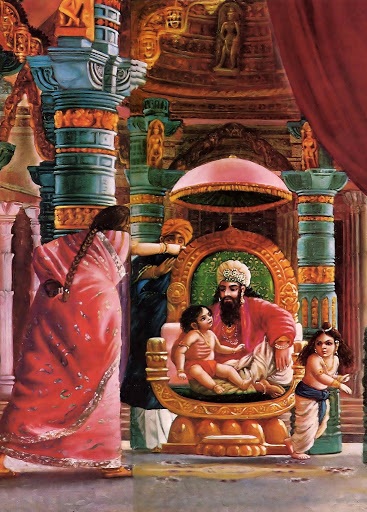*** Read Part 10 ***
Mantra 10 (and kārikā K1.20)
स्वप्नस्थानस्तैजस उकारो द्वितीया मात्रोत्कर्षादुभयत्वाद्वोत्कर्षति ह वै ज्ञानसन्ततिं समानश्च भवति नास्याब्रह्मवित्कुले भवाति य एवं वेद ॥ १० ॥
svapnasthānastaijasa ukāro dvitīyā mātrotkarṣādubhayatvādvotkarṣati ha vai jñānasantatiṃ samānaśca bhavati nāsyābrahmavitkule bhavāti ya evaṃ veda || 10 ||
dvitIyā mātra – The second mātra (of OM)
ukāraḥ – the letter ‘u’
taijasa – is taijasa
svapna sthāna – the dream state
utkarṣāt – because it is superior
vā – or
ubhayatvāt – because it is in the middle.
ya evaṃ veda – Whosoever knows this
ha vai – verily
utkarṣāti – increases
jñāna saṃtati – the flow of knowledge
cha bhavati – and becomes
samānaḥ – the equal (of anyone).
abrahmavit – (A person who is) not a knower of brahman
na bhavāti – is not born
asya kule – in his family.
The letter u, the second mātra of OM, is taijasa, the dream state, because both are regarded as superior and also are in the middle of their respective series. Whoever knows this will become superior in knowledge and accepted by all. All members of his family will be jñānī-s.
The letter u is regarded as superior to a because it comes later in the alphabet and, in the sounding of o, the a ‘resolves’ into u. Whereas a was the basic, unadorned sound made by merely opening the mouth, u is a more subtle sound requiring that we modify the lips significantly.
The subtle taijasa is regarded as superior to vishva because subtle is superior to gross. Also, gross can be considered as the ‘effect’ of the subtle ’cause’. Gross equates to matter, subtle to energy. Mental is superior to physical; it is the quality of our mind that raises us above animals. The gross body returns to earth on death, whereas the subtle and causal bodies continue to rebirth (for the ajñānī). At the macrocosmic (samaṣṭi) level, at the end of the universe (pralaya), the entire gross creation (virāṭ) is subsumed into hiraṇyagarbha.
Each is the middle of its respective series: u comes between a and m; taijasa comes between vishva and prājña.
By meditating on OM, giving attention particularly to the letter u and being aware of these associations, the following benefits will accrue to the seeker who is still primarily interested in material benefits: their mental power and corresponding knowledge will increase; they will be treated equally by everyone, yet envied by no one.
*** Read Part 12 ***

 Dhruva was an adorable little boy. He saw his half-brother, Uttama, sitting and playing on the lap of their father, King Uttanapada. He too desired to climb on to the lap of Uttanapada. But his step-mother could hardly tolerate that. She gave a tight slap to him declaring that he was unfit to sit on the lap of the King as he was not born to her but to another queen. Crest-fallen and deeply hurt, the little kid, with his eyes full of tears, ran to his mother. His mother, a highly noble lady, consoled him and advised that he should achieve something so that people look at him with awe. The little Dhruva left the royal palace and went away to a distant forest. He met with a group of Sages in the forest and narrated to them his soulful story. They advised him to meditate on Vishnu. So, he embarked on a very austere and rigorous course of meditation. Regretting heavily the developments, the King and all his retinue, his mother, the queen and all his family implored that he should give up his askesis and return home. The King was even ready to abdicate the throne and promised to coronate him. But Dhruva was unrelenting. He did not succumb to the temptations and was uncompromising in his resolve. He pursued his meditation with greater vigor. He meditated on Vishnu, the Ultimate.
Dhruva was an adorable little boy. He saw his half-brother, Uttama, sitting and playing on the lap of their father, King Uttanapada. He too desired to climb on to the lap of Uttanapada. But his step-mother could hardly tolerate that. She gave a tight slap to him declaring that he was unfit to sit on the lap of the King as he was not born to her but to another queen. Crest-fallen and deeply hurt, the little kid, with his eyes full of tears, ran to his mother. His mother, a highly noble lady, consoled him and advised that he should achieve something so that people look at him with awe. The little Dhruva left the royal palace and went away to a distant forest. He met with a group of Sages in the forest and narrated to them his soulful story. They advised him to meditate on Vishnu. So, he embarked on a very austere and rigorous course of meditation. Regretting heavily the developments, the King and all his retinue, his mother, the queen and all his family implored that he should give up his askesis and return home. The King was even ready to abdicate the throne and promised to coronate him. But Dhruva was unrelenting. He did not succumb to the temptations and was uncompromising in his resolve. He pursued his meditation with greater vigor. He meditated on Vishnu, the Ultimate.